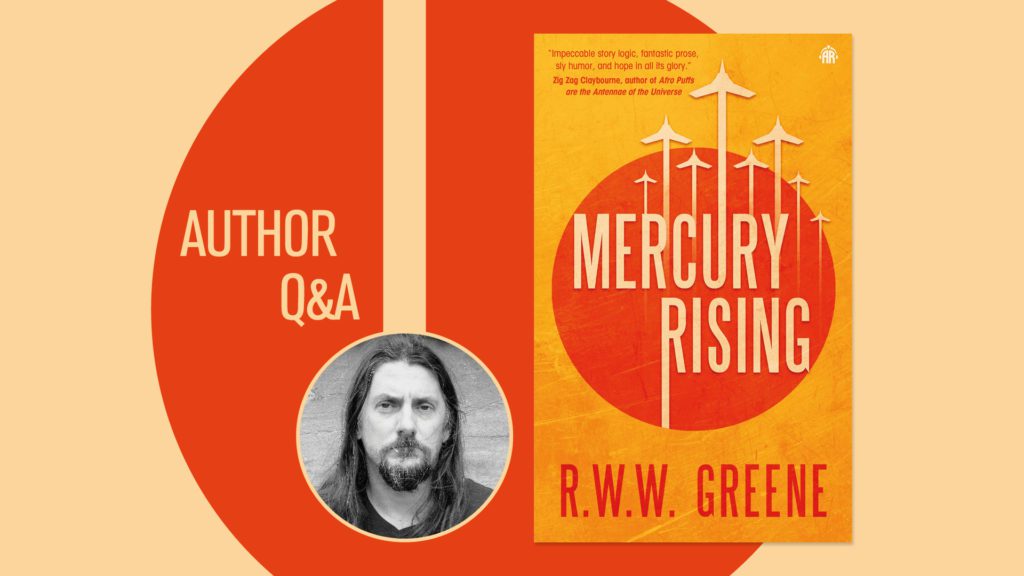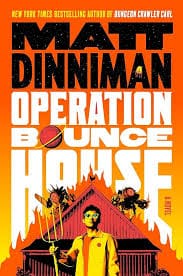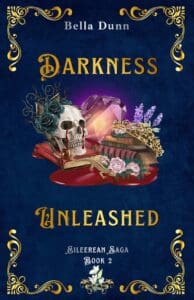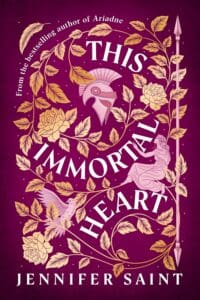
I caught up with R.W.W. Greene to talk about the first book of his new series, Mercury Rising, and to shoot the breeze about alternative history, aliens, and what beer pairs well with sci fi.
A huge thank you to Angry Robot for including us on the blog tour for this title and to Rob for taking the time to talk about it!
BOOK INFORMATION
Mercury Rising by R.W.W. Greene
Series: Mercury Rising
Genre: Sci Fi, Mystery, Alternative History
Intended Age Group: 18+
Pages: 378
Published: 10th May 2022
Publisher: Angry Robot
ABOUT THE BOOK:
Even in a technologically-advanced, Kennedy-Didn’t-Die alternate-history, Brooklyn Lamontagne is going nowhere fast. The year is 1975, thirty years after Robert
Oppenheimer invented the Oppenheimer Nuclear Engine, twenty-five years after the first human walked on the moon, and eighteen years after Jet Carson and the Eagle Seven sacrificed their lives to stop the alien invaders.
Brooklyn just wants to keep his mother’s rent paid, earn a little scratch of his own, steer clear of the cops, and maybe get laid sometime in the near future. Simple pleasures, right? But a killer with a baseball bat and a mysterious box of 8-track tapes is about to make his life real complicated…
Q&A:
Hi Rob, I really loved your previous title Twenty-Five to Life and your latest: Mercury Rising. I appreciate you speaking to FanFiAddict on your vacation!
Hey, I appreciate that very much. I’m glad you enjoyed the books.
You’re a writer and a teacher. What’s a typical writing day like for you?
I’m pretty much a morning writer, which means at the moment I’m getting up at 4:30 a.m. to get some words in before work, which is terrible and awful. But when I’m on a human schedule, I try to get up around 7:30. I like to drift into wakefulness, have some coffee, have a little breakfast, and then go upstairs and write until I hit my goal for the day or run out of steam.
4:30. Yeesh.
Awful, but here’s the rub. I left teaching in 2018 to be a full-time writer/part-time adjunct professor, but the first couple of books that came out, I actually wrote when I was still teaching high school, getting up at 4:30 in the morning. It was actually a very productive time, and the first several months coming off that schedule were kind of difficult to write in. I had so much time that I wasted it
What got you into teaching in the first place?
Teaching was something I always wanted to do. For my college essay, I wrote like I was on a ferry boat or something, and I was a teacher, and I was throwing a typewriter over the side into the ocean, and it was the typewriter that I had just written the Great American Novel on. So, I think teaching was kind of always in the cards, but I didn’t like what was going on in education back when I graduated college, so I put it on the backburner while I did print journalism for eleven years. Toward the end of that, I had a couple of high-school interns at the paper with me, and I enjoyed working with them so much that I got the teaching bug again.
That’s one heck of a journey. Your main characters always seem to go on a journey of discovery. Is that something conscious or just seeing where the story takes them?
I don’t think many people want to read about someone whose plans work out smoothly. When I think about what makes an interesting story or what makes an interesting person, I want to talk to someone who has been places, who has done things, who has not just decided at age twelve what they’re going to do for their entire life and done it. I’m sure there are people who have lived that life, and I’m sure they’re wonderful, but I suspect I wouldn’t find many of them very interesting. Doubt is more interesting than surety. Doubt is a powerful place to exist because it’s a position of openness and flexibility. Do I take this path or that one? I guess maybe that’s my answer, or maybe it’s not my answer.
In Mercury Rising, Brooklyn Lamontagne starts off as a pretty unspectacular guy who is pulled into playing a much bigger part in the story. What inspired you to write a character like Brooklyn in this book?
Brooklyn doesn’t have a lot of goals, he doesn’t have a lot of outside interests. He just wants to get to the other side of the street before a car comes. He could work in a factory, spend his whole life watching TV, drinking too much, yelling at his kids, and locking his view of the world in place with several coats of shellac. Or he could end up in prison, if crime looked like it was a shorter path to the other side of the road. He’s kind of like a rat. Lots of instinct and biological algorithms and weird little rat-brain emotions and chemistry.
Fortunately, rats are generalists. Put someone like Brooklyn where there are no roads, he adapts. But he still wants to keep it simple. He’s not likely to build a house if there is a perfectly good cave at hand.
At one point I’m pretty sure his goal is just to camp in an inflatable tent out the back of his moon buggy and not talk to anyone for weeks …
He loves that Moon buggy! He loves, you know, riding around, listening to music, kicking up regolith, doing the job, going to bed, no one bothering him, no drama entering into his life. He’s safely in the crosswalk again. We had to throw some more bombs his way to get him moving.
What else can readers expect from Mercury Rising?
Hopefully, it’s a fun story. Hopefully, it’s a story that’ll take you places, but it’s essentially the story of the guy from Queens, New York who is way over his head. But it’s also about heroism and what that is, and what it might not be. Mystery Men is one of my favorite movies, and there’s a bit at the end where William Macy, as The Shoveler, is speaking to the press and says something like, “We want this victory to go out to all the other guys, and I’m talking about the people in this city who are super good at their jobs but never get any credit. Like the lady in the DMV – that’s a tough job. And the guy that drives the snow-plow. And the school nurse.”
There’s a great tonal shift in the book from the all-American hero opening to Brooklyn’s coming up from next to nothing.
I think it’s also kind of a study of, like, what is real. The statues we put up. The pedestals. The Pat Tisdales and Jessica Lynches that the Powers That Be try to canonize, when really they’re just folks who got in too deep.
I gotta do a Firefly reference here, speaking of icons with clay feet. In ‘Jaynestown,” the place that idolizes Jayne Cobb because of a misunderstanding, Mal says something like, “My recollection is every man ever got a statue made of him was one kind of son of bitch or other.”
The hero of Canton, the man they call Jayne!
My wife and I had a mostly Firefly wedding. We got married in front of the TARDIS by Princess Leia, and all the guests were dressed in science-fiction cosplay, but I was dressed as Mal and she was dressed as Inara and I made Browncoat Ale and we had an invitation signed by Nathan Fillion.
That wedding sounds absolutely awesome! Also fitting as there were a lot of references in Mercury Rising too …
That was part of the fun for me. The ’70s are such a such an interesting time in terms of politics and music and culture and fashion, and I really wanted to kind of get that into the book. I wanted to build the world there, except with differences in technology and aliens and that kind of stuff. Mercury is the first thing I’ve written using photo references, pictures of ’70s buildings and cars and that kind of stuff, just because I wanted the spirit of that stuff in my head. I was alive during that time, but I was just a kid. There’s a weird kind of faded photograph, like aging Kodak prints, effect around the whole decade for me.
Then we have elements of Americana, an alien menace plot (with weapons that go ZARK!) … how the heck did you fit everything in and make it work!
It took me a while to write. I first started playing with it in 2013, got Brooklyn to the Moon and put it aside. I was working on it again in 2015 when Someone Fancy said I should turn a short story called Love in the Time of Light Speed into a novel and send it to her, so I put Mercury aside again. I pulled it out again after I sold Twenty-Five to Life to Angry Robot and was casting about for the next thing. I had an idea to make it the first book of a quintology, but my agent suggested I scale it back to a more sellable trilogy. We made the deal for two books of that in 2021.
So nine years of writing, off and on. I’m trying to tap into the feel of sci-fi from the decades the books are set in. It’s been a lot of fun. I really like writing near-future stuff, but it’s hard to keep my head in that without wanting to drink heavily.
How has Mercury Rising compared to your other projects with Angry Robot thus far?
Angry Robot has been great to work with all along. The biggest difference to me is that, since I first signed with them, in 2018-19, to now, they’ve reorganized and expanded and gotten their feet firmly under them. They had like three people working for them back in the day, and now they have folks focused on marketing and sales and social media, and etc. They’re growing up fast, and I’m happy they are taking me along with them.
They’re certainly becoming an SFF powerhouse and I’m glad you’re enjoying the ride! So, what’s next for you?
The sequel to Mercury is under contract, and I am delivering the complete manuscript to AR on May 15. It’s due out in June 2023. If all goes well, we will sell tons and AR will acquire the third book and put it out in 2024. If they don’t acquire it, I’ll probably self publish it. Just to put a cap on the trilogy. Meanwhile, I’m trying to figure out what the NEXT THING is. Probably another standalone. The question is: do I want to start looking forward again, continue to look back, or skew sideways in some way.
I’ve seen on Twitter that you sometimes pair books with a beer. What would you recommend for reading Mercury Rising?
I think a good porter pairs well with nearly everything, but considering the times and his inclinations, Brooklyn is probably an American lager man. Pabst or Budweiser. Old Milwaukee, Something that’s only drinkable when it’s really cold. And that might be okay for a summer book.
ABOUT THE AUTHOR:

R.W.W. Greene is based in New Hampshire, USA. He is a frequent panellist at the Boskone Science Fiction & Fantasy Convention in Boston, and his work has seen daylight in Stupefying Stories, Daily Science Fiction, New Myths, and Jersey Devil Press.
Greene keeps bees, collects typewriters, and lives with his writer/artist
spouse, Brenda, and two cats. He is a member of the Science Fiction & Fantasy Writers Association of America.




Leave a Reply